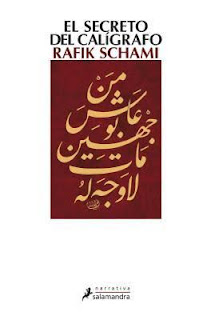I just finished the book today. Its lecture has been very pleasant. I have visited Damascus many times during the past 10 years and I must say that the description of Damascus life in the 50's has been very interesting. The lifestyle, in many ways still the same, specially about family agreements, men and women relationship etc has been very clearful according to my own experience of Damascus life in the early 2000's. The second axe of the book, the love for Caligraphy, and the arabic language has been also very interesting for me. I have been an arabic student as well during four years and I consider their comments about the amount of synonims, and complexity of the language wards off it from whomever approach it to study. So any trial to make it less complexe, either reducing the number of letters or adapting them to the rest of the world languages I consider it would have been a good idea (appart from any religious consideration). I have loved the love affair between Nura and Salman and despite Hamid Farsi is for me a radical (most probably due to the circumstances of his life time) I had the feeling that he should have had some better chances. I have loved the narrative and description technique of Rafik Schami and also the fact that he describes as a very normal happening in teh 50's in Syria, the presence of gay relationships, adulterium, multiple sexual affairs, hammam interiorities, betrayals and loyalties and also true loves. I recover 3 discoverings for myself: 1) The Feminin literary club of Syria founded in 1922 by cristian families, who let the muslim women to join. 2) When Hamid writes the first poem in presence of his father and sentence: The writting had music and 3) Mansur valuated Hamid's idea of renovating the arabic language but he insisted that it would never be possible unless the Religion would be separated from the State, something that only happened in Turkey so far.
Acabo de terminar el libro hoy. Su lectura ha sido placentera. He visitado Damasco muchas veces durante los últimos diez años y debo decir que la descripción de la vida de la ciudad en los años cincuenta ha sido reveladora. El estilo de vida ha continuado, en muchos aspectos, idéntico, especialmente las relaciones familiares, acuerdos entre familias para los matrimonios etc.. y han sido claramente identificados con mi propia experiencia durante las visitas y gentes que conocí en los primeros años dos mil en la tan añorada ahora Damasco.
El segundo eje de la novela, el amor por la caligrafía y el alfabeto árabe ha sido también muy interesante. He sido estudiante de este idioma durante cuatro años y considero que los comentarios del escritor sobre el número de sinónimos y complejidad de la lengua aleja a todo novel estudiante que se aproxima a ella. (siempre aparte de consideraciones religiosas).
Me ha encantado la historia de amor entre Nura y Salman y aunque Hamid Farsi me ha parecido un radical en muchos aspectos (quizá obligado por sus circunstancias), considero que podría haber tenido mejor final.
La narrativa y descripción de Rafik Schami me ha enganchado desde el principio, en especial la naturalidad con la que describe circunstancias cotidianas de Damasco en los años cincuenta, como la presencia de relaciones homosexuales, adulterios, múltiples relaciones sexuales y prostitución, interioridades de los hammams y verdaderas historias de amor.
Finalmente, 3 descubrimientos interesantes que he conseguido con este libro:
1) El club literario femenino de Siria que fue fundado en 1922 por familias cristianas y al que permitieron su acceso a mujeres musulmanas
2) Cuando Hamid escribe su primer poema en presencia de su padre y sentencia que la escritura tenía música (me parece sublime)
3) Mansur validó la propuesta de Hamid de renovar el alfabeto árabe pero insistió en que sería imposible hasta que la religión y el estado se separasen, algo que solo ha sucedido en Turquía y que, por el momento, parece aún más imposible que en los años cincuenta. (less)

No hay comentarios:
Publicar un comentario
Aguardo tus comentarios: